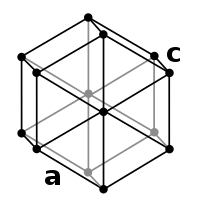
Photo from wikipedia
Abstract Palladium nanoparticles with varying particle diameter (6.9–25.1 nm) have been synthesized by single-pot wet chemical technique in presence of poly vinyl alcohol by controlling the duration of reflux. The resulting… Click to show full abstract
Abstract Palladium nanoparticles with varying particle diameter (6.9–25.1 nm) have been synthesized by single-pot wet chemical technique in presence of poly vinyl alcohol by controlling the duration of reflux. The resulting nanoparticles have been dip-coated on Ni-foil, followed by determination of kinetic parameters of the anode-catalysts in reference to alkaline oxidation of methanol (AOM) by electrochemical and IR-spectroscopic techniques. The morphology and surface characteristics of the Pd nano-catalyst have been investigated by electron microscopy in conjugation with energy dispersion spectroscopy. The results show the formation of formate and carbonate with no change in selectivity but improved kinetic parameters on decreasing the diameter of constituting Pd nanoparticles. The studies of cyclic voltammetry of methanol, formaldehyde and formate reveal that the electrode constituted with Pd nanoparticles having average diameter of 6.9 nm obtained by applying the lowest time (0.33 h) of reflux, is the best for all the fuels. The studies also help understanding the stability of the electrodes, proposition of the intermediates and plausible mechanism of the reaction.
Journal Title: International Journal of Hydrogen Energy
Year Published: 2017
Link to full text (if available)
Share on Social Media: Sign Up to like & get
recommendations!